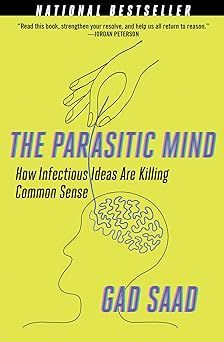The Parasitic Mind: How Infectious Ideas Are Killing Common Sense
4.7
-
4,771 ratings
"Read this book, strengthen your resolve, and help us all return to reason." —JORDAN PETERSON
USA TODAY NATIONAL BESTSELLER
There's a war against truth... and if we don't win it, intellectual freedom will be a casualty.
The West’s commitment to freedom, reason, and true liberalism has never been more seriously threatened than it is today by the stifling forces of political correctness.
Dr. Gad Saad, the host of the enormously popular YouTube show THE SAAD TRUTH, exposes the bad ideas—what he calls “idea pathogens”—that are killing common sense and rational debate. Incubated in our universities and spread through the tyranny of political correctness, these ideas are endangering our most basic freedoms—including freedom of thought and speech.
The danger is grave, but as Dr. Saad shows, politically correct dogma is riddled with logical fallacies. We have powerful weapons to fight back with—if we have the courage to use them.
A provocative guide to defending reason and intellectual freedom and a battle cry for the preservation of our fundamental rights, The Parasitic Mind will be the most controversial and talked-about book of the year.
Kindle
$12.99
Available instantly
Audiobook
$0.00
with membership trial
Hardcover
$24.86
Paperback
$15.29
Ships from
Amazon.com
Payment
Secure transaction
ISBN-10
162157959X
ISBN-13
978-1621579595
Print length
235 pages
Language
English
Publisher
Regnery
Publication date
October 05, 2020
Dimensions
6 x 1.3 x 9 inches
Item weight
15.7 ounces
Popular Highlights in this book
A fair society ensures that its members have equality of opportunities and not equality of outcomes as mandated by DIE edicts.
Highlighted by 1,018 Kindle readers
There are two fundamental ethical orientations that guide people’s daily behaviors: deontological and consequentialist ethics.
Highlighted by 951 Kindle readers
Confucius was correct: “To know what you know and what you do not know, that is true knowledge.”
Highlighted by 930 Kindle readers
There is an ever-increasing ideological pressure to come up with more egregious departures from reason, as a signal of one’s progressive purity.
Highlighted by 853 Kindle readers
Product details
ASIN :
B0853F4VKP
File size :
2500 KB
Text-to-speech :
Enabled
Screen reader :
Supported
Enhanced typesetting :
Enabled
Word wise :
Enabled
Editorial Reviews
"A wonderfully intelligent, witty, and riveting account of the politically correct madness engulfing our society. The Parasitic Mind is a must-read for anyone concerned about victim politics, cancel culture, and the assault on reason. Saad not only expertly diagnoses the malady, he also points the way to a cure."
-- "Christina Hoff Sommers, resident scholar at the American Enterprise Institute and co-author of One Nation Under Therapy"
"Read this book, strengthen your resolve, and help us all return to reason."
-- "Jordan Peterson, PhD, clinical psychologist, professor of psychology at the University of Toronto, and author of 12 Rules for Life: An Antidote to Chaos"
"A virus is sweeping through our civilization--a mind virus corrupting the brains of students, professors, and the public at large--and The Parasitic Mind is the vaccine that will counter this pernicious pandemic."
-- "Michael Shermer, PhD, publisher at Skeptic magazine and New York Times bestselling author of Giving the Devil His Due"
"His courage, his rationality, and his enthusiasm for that much-neglected thing, the truth, shine through this powerful book."
-- "Matt Ridley, PhD, New York Times bestselling author of The Rational Optimist and How Innovation Works"
"With disarming humor and withering logic, evolutionary behavioral scientist Gad Saad shows us that self-delusion is an equal-opportunity employer, not defined by race, ethnic background, sexual orientation, political leanings, or level of education. Nothing is taboo. To read The Parasitic Mind is to understand why so many people either embrace Saad for his clarity or reject him for holding up a mirror to their inconsistencies."
-- "Paul A. Offit, MD, Maurice R. Hilleman Professor of Vaccinology, Perelman School of Medicine at the University of Pennsylvania, and author of Deadly Choices: How the Anti-Vaccine Movement Threatens Us All"
Sample
CHAPTER ONE
From Civil War to the Battle of Ideas
I am often asked why I am an outspoken academic, willing to tackle thorny and difficult issues well beyond my areas of scientific interest. Given the stifling political correctness that governs academia, it would be advisable from a careerist perspective to be the proverbial “stay in your lane” professor. So why do I stick my neck out repeatedly? As is true of most human phenomena, the answer lies in the unique combination of my personhood (genes) coupled with my personal history (environment). On a personal level, I am a free thinker who is allergic to go-along, get-along group think. The ideals that drive my life are freedom and truth, and any attack on these ideals represents an existential threat to all that I hold dear. I am also the product of my unique life trajectory shaped by two wars. While few people will ever experience the horrors of war, I have faced two great wars in my life: the Lebanese Civil War and the war against reason, science, and logic that has been unleashed in the West, especially on North American university campuses. The Lebanese war taught me early about the ugliness of tribalism and religious dogma. It likely informed my subsequent disdain for identity politics, as I grew up in an ecosystem where the group to which you belonged mattered more than your individuality. With that in mind, let us return to my homeland in the Middle East.
Growing Up in Lebanon
I was born in Beirut, Lebanon, in 1964 and spent the first eleven years of my life in the “Paris of the Middle East.” My family was part of the dwindling Jewish community that had steadfastly remained in Lebanon despite the growing signs that Lebanese Jews had a bleak future. My father had nine sisters and a brother, while my mother had six sisters, all of whom, with the exception of one paternal aunt, had emigrated from Lebanon long prior to the outbreak of the civil war in 1975. My maternal grandparents died prior to my birth; my paternal grandparents left for Israel around 1970. A similar immigration pattern occurred within my immediate family. I have two brothers and one sister, all much older than I (the closest to me in age is ten years older). My eldest brother married a Christian woman of Palestinian origin, and they immigrated to Montreal, Canada, in 1974. My sister also moved to Montreal prior to the outbreak of the civil war, both to pursue her studies and to escape the looming dangers. Finally, my other brother who had been crowned Lebanese champion of judo on multiple occasions was forced to flee our homeland due to ominous threats that he should retire (for it was not good optics for a Jew to repeatedly win a combat sport). He heeded that “advice” and moved to Paris, France, around 1973 to continue his studies and judo career. The breathtaking irony is that he eventually represented Lebanon at the 1976 Montreal Olympics. Hence, the Jewish judoka who was no longer welcomed in Lebanon only a few years earlier was “embraced” when it suited the relevant authorities.
Growing up as a Jewish boy in Lebanon had its existential challenges. I vividly recall when the Egyptian president Gamal Abdel Nasser died in 1970, a few weeks shy of my sixth birthday. Nasser’s Pan-Arabism (unification of the Arab world) had made him a hero in the region, and as often happens in the Middle East, thousands of people took to the streets to publicly lament his passing. Why would this event constitute an episodic memory for a five-year-old boy? As the angry procession made its way down our street (aptly named Rue de l’Armée or The Military’s Street), the terrifying chant “Death to Jews” left an indelible mark on me as I cowered in hiding next to our balcony. You see, even in “progressive, modern, and pluralistic” Lebanon, endemic Jew-hatred was always ready to rear its ugly head. All calamities in the Middle East are ultimately due to the diabolical Jew. It rained today. Blame the Jews. The economy is weak. Blame the Jews. Tourism is down. Blame the Jews. You contracted a stomach bug. Blame the Jews. The Christians and Muslims in Lebanon are not getting along. You guessed it, blame the Jews. And contrary to current attempts at revisionist history, this existential disdain for the Jew precedes the founding of modern Israel by 1,400 years. I can still remember sitting around the table on Yom Kippur (the holiest day in Judaism) in 1973 watching the worried look on my parents’ faces as word broke that a combined Arab army had attacked Israel on that holy day. Existential genocidal hatred is not something that one magically and suddenly contracts as an adult; rather, it is instilled insidiously and repeatedly in the minds of otherwise pure and innocent children. I was the only one of my four siblings not to attend a Jewish elementary school. I must have been nine or ten years old, in class at the Lycée des Jeunes Filles, when the teacher asked pupils to state what they wanted to be when they grew up. Typical responses were uttered uneventfully (policeman or soccer player) until one student said, “When I grow up, I want to be a Jew killer,” after which the class erupted in raucous laughter and gleeful claps. I still have the class photos from that era, and that boy’s face is forever etched in my memory.
In sharing these stories, I don’t wish to imply that our daily lives in Lebanon prior to the civil war were hellish. My parents were well entrenched within Lebanese society. The fact that we were part of the last wave of Jews to leave Lebanon was a testament to my parents’ overall attachment to our homeland. Most of my childhood friends were Christian and Muslim (one of whom recently reached out to me, as his daughter was about to start college in Montreal). Any hope of long-lasting peaceful coexistence was shattered once the civil war broke out in 1975. This conflict remains the standard by which the butchery of all other civil wars is gauged. Neighbors who had lived next door to one another for decades became instant prospective enemies. Death awaited us at every corner. If the endless shelling did not kill you (we learned to take cover or not depending on the whistle signature of the bombs), the snipers might if you appeared within their field of vision. Civilians were kidnapped and killed. They were also mowed down while waiting in long bread queues (two of my family members evaded such a death by going out late to buy bread during a ceasefire). Various militia set up roadblocks at which point they’d check to see your internal ID (which had one’s religion written on it). If you were of the “wrong” religion, you could be executed. Our religious heritage was written as “Israelite” rather than “Jewish,” which meant we had few Muslim friends at roadblocks. Of the innumerable terrifying moments that I experienced during the civil war, one sticks out in my mind as uniquely eerie and ominous.
Prior to the start of the war, my parents had contracted a hand dryer service that provided a roll of washable textile which was installed on the wall of our kitchen. This was a precursor of the subsequent models of disposable hand drying tissues found in public bathrooms. Periodically, the same individual would come to our house to remove the dirty roll and replace it with a clean one (I believe his name was Ahmad or perhaps Mohammad). I thought that this was a rather strange service then, and even more so now as I recount the story. One evening, in the middle of the otherwise endless street-to-street fighting and continuous bomb shelling, I heard a knock at our front door. I walked to the door and asked who was there. The reply came: “It’s me Ahmad [Mohammad], the guy who changes your kitchen roll. Open the door, kid.” I delayed, and his insistence grew more sinister and forceful: “Open the door now!” I ran to my mother. If memory serves me right, there were four occupants at our house that evening: my mother, my sister (who had returned to Beirut to visit us and was now stuck there), a male friend of my parents (who was also stuck at our house even though he lived a short drive away), and myself. My father was not at home; I believe he was outside the country, but I can’t remember why he was away. He eventually returned to Beirut and narrowly escaped death on the drive back to our home. My mother approached the door and talked through it with Ahmad who was accompanied by one or more men. The exchange grew tense, and my mother fetched the male friend who was cowering in another room. She hoped he might frighten them away, and I recall the disgust and anger that my mother expressed for this male friend’s breathtaking cowardice in refusing to help.
Read more
About the authors
Gad Saad
Dr. Gad Saad is Professor of Marketing at Concordia University (Montreal, Canada), and former holder of the Concordia University Research Chair in Evolutionary Behavioral Sciences and Darwinian Consumption (2008-2018). He has held Visiting Associate Professorships at Cornell University, Dartmouth College, and the University of California–Irvine. Dr. Saad received the Faculty of Commerce’s Distinguished Teaching Award in June 2000, and was listed as one of the ‘hot’ professors of Concordia University in both the 2001 and 2002 Maclean’s reports on Canadian universities. Saad was appointed Newsmaker of the Week of Concordia University in five consecutive years (2011-2015), and is the co-recipient of the 2015 President’s Media Outreach Award-Research Communicator of the Year (International), which goes to the professor at Concordia University whose research receives the greatest amount of global media coverage.
Read more
Reviews
Customer reviews
4.7 out of 5
4,771 global ratings
OKProud
5
How to return to law and order
Reviewed in the United States on June 9, 2024
Verified Purchase
Dr Saad does an excellent job of expressing our country’s need for its citizens to stand up for what is right, stop the self-flagellation, and start again punishing criminal behavior, whoever the culprit may be. If a protest goes south and looting, burning, assault, battery, and vandalism ensues, bring in the men and women of law enforcement to stop it, and bring the law to bear against the guilty people and organizations, whatever their race, religion, gender, or sexual orientation. Take out the political leaders who interfere with the process and replace them with leaders willing to fight for it. Thanks Dr. Gaad for challenging us to do better and be better guardians of this great country of ours!
Read more
RANDY CUBILLO
5
great read!
Reviewed in the United States on June 6, 2024
Verified Purchase
i learned so much from this. i thought the West was better in handling these new unknowns. it’s laudable for someone so bravely standing up against the assault of the unacceptable and unscientific
Amazon Customer
5
Easy read, clearly shows cause and affect to most of today's chaies
Reviewed in the United States on June 8, 2024
Verified Purchase
He makes clear statements of what is happening to our society, he gives factual support as to why, and describes the solution to fix it which is rather simple: speak up, have an opinion, and don't be afraid to defend and listen to others.
That said, he does go wild with a lot of huge combo-words that slows the read down. However, it helped my scrabble game considerably :)
Read more
Ezequiel Braun Pellegrini
5
the battle of our time in simple language. recomiendo a todos
Reviewed in the United States on May 12, 2024
Verified Purchase
Simple, imposible de dejar de leer, y basado en científicamente comprobables datos. Must read for everyone. Recomendable y necesario libro
3 people found this helpful
Leib Gershon Mitchell
4
"Seemingly a Linear Combination of Many Other Books"
Reviewed in the United States on November 26, 2023
Verified Purchase
Book Review The Parasitic Mind
4/5 stars
This book feels like an expansion/rewrite of several books that I've read:
- Richard Dawkins' evolutionary concept of a meme. (The Selfish Gene.)
Viruses (nonliving entities) can take over the replication machinery of a cell in such a way that they cause destruction. And so, ideas (also nonliving entities) can take over the reasoning process of human beings in such a way that they cause massive destruction. (The author gives several real life examples of neuroparasitology. p.18)
-
Douglas Murray (Madness of Crowds)/ Heather MacDonald (Burden of Bad Ideas°°°Diversity Delusion)/ Levitt& Gross (Higher Superstition). The general inanity of left wing academia plus witch hunts against dissidents. (p.16) Universities serve as patient zero for a broad range of other dreadfully bad ideas and movements. Paul Johnson calls them "that traditional home of lost causes, the university campus. "
-
Eric Hoffer. (The True Believer.) The interchangeability of mass movements. It's a coincidence that these idiots become "Diversity and Inclusion Specialists." In another time and place, they might have been Nazis or Communists or Satmar Hasidim.
-
Ryan Anderson. (When Harry Became Sally.) Expansion of the transgender hysteria.
-
Hairy/Lukianoff. (The Coddling of the American Mind.) Opposing viewpoints constitute a form of "violence," and everyone is entitled to be safe at all times and places (p.95). Excessively safe spaces are maladaptive. Concept creep.
The author is a secular Lebanese Jew who lived through the Lebanese Civil War. (People who live through wars / the end of wars are a great source of creativity. Think Nicholas Taleb. Secular Jews also seem to be a huge source of intellectual creativity- some good, much bad. Think Noam Chomsky/ Saul Alinsky.)
Lebanese Civil War survivors are also helpful because they have lived through an event that was entirely a creation of the intelligensia: Saad draws analogies of how foolish ideas can set people who have been living in peace for many centuries against one another with disastrous consequences (p.4), such as the Lebanese civil war. (Nicholas Taleb made the exact same observation years before this book.)
Saad's betes noires are all identified within the first chapter (p.21): 1. Radical feminism; 2. Post-modernism; 3. Social constructivism; 4. Political correctness; 5. Identity politics coupled with self flagellation; 6. Culture of perpetual offense and victimhood; 7. Echo Chambers void of intellectual diversity; 8. Cultural and moral relativism.
Second order thoughts:
¶¶¶If we keep the biological analogies going, shouldn't we question that....
-
Death is a natural thing for all organisms/ societies?
-
Death is a sine qua non for all types of evolution? (Some societies have to make mistakes so that something better can come from their ashes.)
-
As organism-societies die, doesn't create room for newer and better of the same to take their place? (For example: one that understands that "academic freedom" ain't free?)
-
Won't an organism with absolutely no adaptive stressors tear itself apart? (Sitting on the couch eating too many donuts for too long will bring you to your end quicker than going out and running 10 miles a day. The Ascendant West has had a comfortable position for too long, and they have been sitting on the Metaphorical Sofa of Comfort too long.... with predictable disastrous consequences.)
So, if Western society is in the process of tearing itself apart (and that process is facilitated by its Chattering Classes / universities), then does that mean that societies that learn to keep them in check will be the ones that survive? (China. Russia.)
¶¶¶So, some number of intellectuals are all on the wrong side of something. So now what? (In point of fact, that entire book was written by Thomas Sowell. Intellectuals and Society.)
The entirety of both World Wars was an example of such miscalculation...... Plenty of death, destruction, and loss of life.
All for no ostensible reason.
And we may be headed toward the same thing all over again.
And.....so now what? Is this the first time that this has happened? (Answer: NO. Historical China and historical Tibet were both stagnant societies for in excess of 1,000 years because cognoscenti class caught onto stupid ideas.)
Idea streams and topics rehashed:
- Memetics. (Richard Dawkins.)
- System 1 and system 2. (Daniel Kahmemann.)
- Deontological versus consequentialist notions of truth. (Immanuel Kant. Jeremy Bentham.)
- Sokal Hoax is expanded into the "seven accepted grievance studies papers" (p.78).
- Cogito ergo sum-->I am a victim therefore I am.
- Popper's Falsification Principle.
- Kleptogamy. (Q: Why are all of these men at feminist rallies wimpy beta males? A: "Freud was a fool and reductionist, but sexual strategizing by losers is the source of nearly all left-wing ideology")
- Paradox of Tolerance. (Popper, again.)
Of the book:
- 191 pages of prose over eight chapters works out to ≈24 pages / chapter. Enough to read in one sitting or over a lunch break.
- Several hundred bibliographic citations.
- Some new words: epistemological dichotomania/polylogism/ kleptogamy.
The book is useful not because of novelty (as before, these ideas have been rehashed many other times and many other places), but because it is a repetition to make people aware of what is happening.
Verdict: I purchased this book for $14.99 for used copy, but since it is so much recapitulation of things that I already knew.....I will value it at about $2
Read more
13 people found this helpful
Best Sellers

The Great Alone: A Novel
4.6
-
152,447
$5.49

The Four Winds
4.6
-
156,242
$9.99

Winter Garden
4.6
-
72,838
$7.37

The Nightingale: A Novel
4.7
-
309,637
$8.61

Steve Jobs
4.7
-
24,596
$1.78

Iron Flame (The Empyrean, 2)
4.6
-
164,732
$14.99

A Court of Thorns and Roses Paperback Box Set (5 books) (A Court of Thorns and Roses, 9)
4.8
-
26,559
$37.99

Pretty Girls: A Novel
4.3
-
88,539
$3.67

The Bad Weather Friend
4.1
-
34,750
$12.78

Pucking Around: A Why Choose Hockey Romance (Jacksonville Rays Hockey)
4.3
-
41,599
$14.84

Start with Why: How Great Leaders Inspire Everyone to Take Action
4.6
-
37,152
$9.99

Tomorrow, and Tomorrow, and Tomorrow: A novel
4.4
-
95,875
$13.99

Weyward: A Novel
4.4
-
27,652
$11.99

Tom Lake: A Reese's Book Club Pick
4.3
-
37,302
$15.74

All the Sinners Bleed: A Novel
4.4
-
12,894
$13.55

The Mystery Guest: A Maid Novel (Molly the Maid)
4.3
-
9,844
$14.99

Bright Young Women: A Novel
4.2
-
8,485
$14.99

The Wager: A Tale of Shipwreck, Mutiny and Murder (Random House Large Print)
4.5
-
28,672
$14.99

Hello Beautiful (Oprah's Book Club): A Novel (Random House Large Print)
4.4
-
79,390
$14.99

Small Mercies: A Detective Mystery
4.5
-
16,923
$10.00

Holly
4.5
-
31,521
$14.99

The Covenant of Water (Oprah's Book Club)
4.6
-
69,712
$9.24

Wellness: A novel
4.1
-
3,708
$14.99

The Art Thief: A True Story of Love, Crime, and a Dangerous Obsession
4.3
-
4,805
$14.99

The Berry Pickers: A Novel
4.5
-
14,209
$14.99
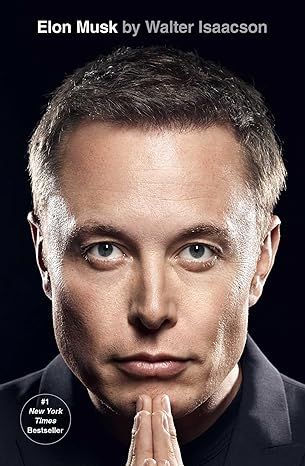
Elon Musk
4.7
-
15,272
$16.99

Just for the Summer
4.6
-
19,524
$11.99
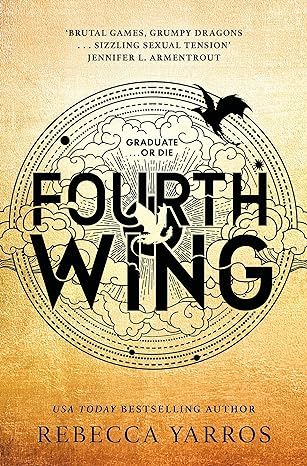
Fourth Wing (International Edition)
4.8
-
206,495
$7.95
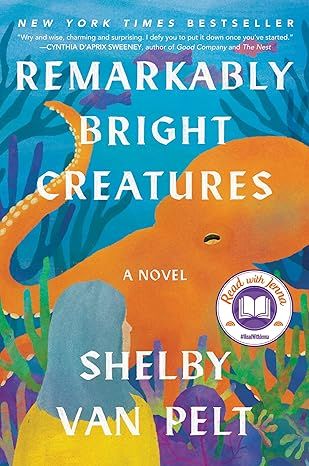
Remarkably Bright Creatures: A Read with Jenna Pick
4.6
-
65,556
$15.80
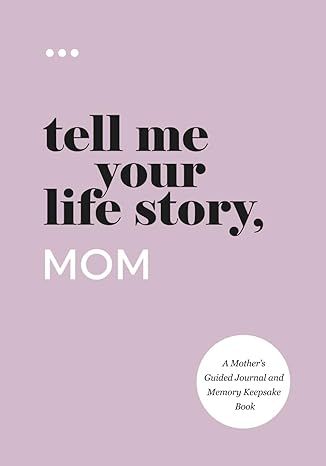
Tell Me Your Life Story, Mom: A Mother’s Guided Journal and Memory Keepsake Book (Tell Me Your Life Story® Series Books)
4.7
-
5,107
$11.24
